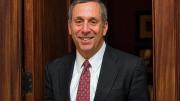Universities are among the most creative and powerful forces for shaping the future. At our best, we prepare students to devote their lives to causes larger than themselves. We bring together scholars whose insights help illuminate and address society’s greatest challenges. We convene conversations that help envision how tomorrow might be better than today.
If the future is our genuine concern, we must face up to the stark reality of climate change. The scientific consensus is by now clear: the threat is real, the potential consequences are grave, and the time to focus on solutions is now. Climate change poses an immediate and concrete test of whether we, as members of a university and responsible inhabitants of our planet, will fulfill a sacred obligation: to enable future generations to enjoy, as we are privileged to enjoy, the wonders of life on Earth.
While there is much we are already doing, we have far more still to do. Our faculty, students, and staff are seeking to understand the mechanisms and effects of climate change, and to devise technologies that can accelerate the transition to cleaner, greener energy. They are exploring how best to shape policies and incentives conducive to dec arbonizing the global economy and mitigating climate risks locally, nationally, and internationally. They are imagining the future of buildings, transportation systems, and communities and cities large and small, in a world where sustainability progresses from emerging ideal to pervasive practice. They are addressing the crucial role industry must play in reducing the world’s dependence on fossil fuels and embracing an ethos of sustainability. They are asking how individuals, organizations, and entire societies can be motivated to pursue transformative and disorienting change in the face of uncertainty, inertia, and sometimes outright denial. Our efforts must include addressing the concerns of people understandably anxious about the impact of such change on their jobs, their families, and their ways of life. Effectively confronting climate change is a social, economic, political, and human challenge no less than a scientific and technological one.
This work is not easy, and the solutions are not obvious—all the more reason they demand our attention. We must build on the efforts of our Climate Change Solutions Fund, our University Center for the Environment, and the growing array of programs and initiatives across our schools that regard climate change and the future of energy as a focal concern. We must meet a perennial Harvard challenge: not just multiplying our distributed efforts but finding ways to connect and amplify them. We must be a willing partner and active convener in the search for solutions. The stakes are too high, and the need for cooperative effort too great, for us not to engage others in forging pathways forward.
As we redouble our research, education, and engagement, we must also pursue sustainable practices on campus—with emphasis on reducing our energy consumption, embracing renewable sources, and mitigating greenhouse gas emissions and their harmful effects. Through the Climate Action Plan adopted in 2018, we hope to become fossil fuel-neutral by 2026 and fossil fuel-free by 2050. With the guidance of our Office for Sustainability, we are committed to serving as a living lab for innovative approaches, hoping our work can help others as well. Sustainability is the daily work of each of us—in what we choose to consume, how we travel, how we live our everyday lives.
Amid our larger academic and institutional efforts, debate over investment policy—including demands to divest from the fossil fuel industry—will no doubt continue at Harvard and beyond. This debate is healthy. And while I, like my predecessors, believe that engaging with industry to confront the challenge of climate change is ultimately a sounder and more effective approach for our university, I respect the views of those who think otherwise. We may differ on means. But I believe we seek the same ends—a decarbonized future in which life on Earth can flourish for ages to come.
Reaching that goal means recognizing climate change as a defining challenge of our time. I hope we can all find common cause in the wider search for innovative, collaborative, effective solutions. We owe the future nothing less.









